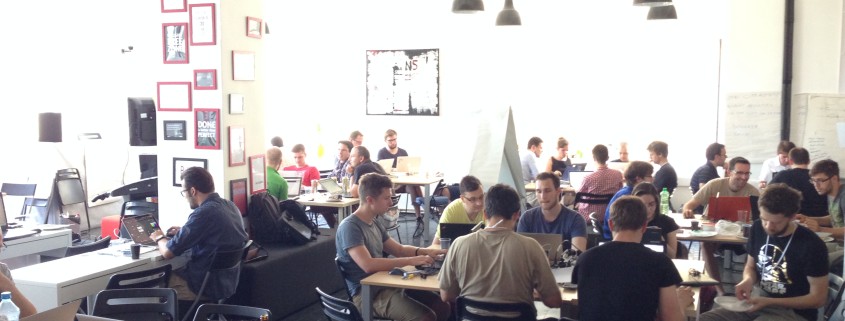#PragueHacks Attracts 80 Hackers, Winner Announced
This weekend’s #Praguehacks event, which involved about 80 local and visiting hackers, and focused on open city data provided by the Prague Institute for Planning and Development (IPR), has announced a winner!
The Winner
“Naše školy,” which you can read more about at PragueHacks.cz, will make previously fragmented data concerning public schools in Prague and the surrounding region, allowing users to compare schools across many different criteria. Their project involved developing an API and a showcase app that could be applied to any set of school data.
Their platform could be seen as a kind of “trip advisor” for schools, and could be applied to any city, provided that the data is available.
The team, led by Marek Lisý, and including Šimon Rozsíval, Martin Egrt, Honza Kašpárek, Lenka Moutelíková, Tomáš Fejfar, and Michal Zwinger, demonstrated how open data applications can be used to push public institutions to release data that is in the public interest.
At the same time, in only two days, the team built a persuasive prototype, showing the advantages of having the data available, and giving a clear idea of how it can be used.
The winning team of #PragueHacks announced! Prague school data are to be reloaded soon. pic.twitter.com/Jbg6hGYEPG
— Michal Tošovský (@MTosovsky) June 14, 2015
The Weekend
#praguehacks starts!!! pic.twitter.com/u71sLszAvh
— Petr Biskup (@BiskupPetr) June 12, 2015
Hackers arrived starting Friday evening, and were greated by StartupYard Managing Director Cedric Maloux. Anyone with an idea for the hackathon was invited to pitch that idea, which about 20 teams did. Later, hackers in attendance matched themselves with the ideas they found interesting, breaking up into groups of between 2 and 7 people each.
Then the hacking began, and continued straight through to Sunday evening, with a number of hackers even choosing to sleep the night in Node5, StartupYard’s home workspace, and the host of the hackathon. 3 meals a day, plus snacks, were provided, along with free Redbull and other energy drinks to keep everyone going.
Commercial and Non-Profit
While many of the ideas from early in the hackathon mutated and changed through the course of the weekend, often based on what was feasible in a short period of time, and what data was available, there was a steady mix of for-profit, and non-profit ideas represented.
Ideas often centered around visualizations of public information. For example, Parking in Prague, City Activity, and Signalizator, all try to give an overview of actual conditions in the city, helping visitors and residents to more easily navigate and get things done.
Teams like Storyteller Prague went even further, offering guided tours of the city, using offline content. Other groups like Walkz, LuckyMe, OpenFlats and wHeReToLiv.prg, attempted to give an overview of general conditions in the city, allowing people to see a mix of private and public information related to housing, crime, transportation, and other aspects of city life.
http://t.co/E0OeQjKx3Y #praguehacks a live overview of the Prague tram network! pic.twitter.com/EPAy36DL8W
— StartupYard (@startupyard) June 14, 2015
Sbirej.to, also known as “pick it up,” is an application that allows anyone in the city to flag and report areas in which dog owners have not cleaned up after their pets, and allow pet owners to report a lack of dog bags and bins. While such platforms do already exist, the team built Sbirej.to as a proof of concept for a more frictionless and fun UI, which would encourage typically disengaged city residents to become more active in reporting issues of basic city maintainence.
Was #PragueHacks a Success?
The object of this hackathon was twofold. First, we wanted to engage local citizen hackers and developers with the problems of modern city living, and inspire them to come up with new solutions to issues that any city’s residents might face on a daily basis.
On that score, we can count this event as a sound success: the teams came up with innovative and promising ideas about engaging citizen interest, making data more available to people, and improving the daily lives of city residents and visitors both.
Second, the object of the hackathon was to put pressure on public institutions, in Prague and elsewhere, to make public data more accessible, more comprehensive, and of higher quality.
Time will tell whether this event has been a success on that score, but we think it will be. Groups like NeverRun, which is pictured above, helped to highlight the fact that information people want, such as the actual locations of trams and busses on the transport network at any given time, needs to be made available by the city- as, they pointed out, it is available in other cities like Brno.
The hackathon winners, too, built their school evaluation app and API as a proof of what high quality data can provide to city residents. This should push more cities and municipalities to make more and better data available for these purposes. Once city residents and officials see the potential uses of the data, they should also understand the importance of making it public and highly visible.
Many Thanks
We have many individuals and groups to thank for the success of this weekend’s hackathon. Among them are Fond Otakara Motejla, which did much of the work to organize the event. We also thank the city of Prague and IPR Praha, for making the data available to our citizen hackers.
In addition, the French Embassy and British Embassy, Credo Ventures, the ReSite conference, IBM and Microsoft, along with Vodafone Foundation, lent their invaluable support, for which we are very greatful.
We would especially like to thank the mentors who volunteered a great deal of their time and energy to making this event a success, and last but not least to the hackers, without whom none of our efforts would have mattered. Thanks to all who came and shared a common goal with us this weekend!




